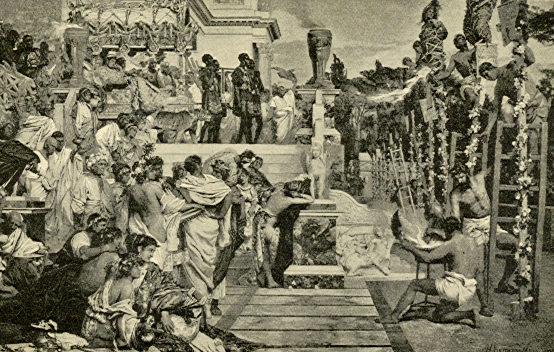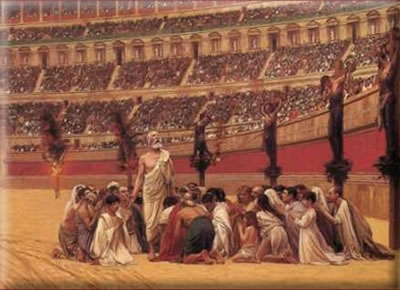PERSECUTION OF CHRISTIANS UNDER EMPEROR NERO
---------------------------

----------------------------


-----------------------------

----------------------------- The Neronian persecution took place A. D. 64. The occasion was the great fire which destroyed a large part of the city of Rome. To turn public suspicion from himself as responsible for the fire, Nero attempted to make the Christians appear as the incendiaries. Many were put to death in horrible and fantastic ways. It was not, however, a persecution directed against Christianity as an unlawful religion. It was probably confined to Rome and at most the immediate vicinity, and there is no evidence that it was a general persecution
Neither by works of benevolence nor the gifts of the prince nor means of appeasing the gods did the shameful suspicion cease, so that it was not believed that the fire had been caused by his command. Therefore, to overcome this rumor, Nero put in his own place as culprits, and punished with most ingenious cruelty, men whom the common people hated for their shameful crimes and called Christians. Christ, from whom the name was derived, had been put to death in the reign of Tiberius by the procurator Pontius Pilate. The deadly superstition, having been checked for a while, began to break out again, not only throughout Judea, where this [pg 007]mischief first arose, but also at Rome, where from all sides all things scandalous and shameful meet and become fashionable. Therefore, at the beginning, some were seized who made confessions; then, on their information, a vast multitude was convicted, not so much of arson as of hatred of the human race. And they were not only put to death, but subjected to insults, in that they were either dressed up in the skins of wild beasts and perished by the cruel mangling of dogs, or else put on crosses to be set on fire, and, as day declined, to be burned, being used as lights by night. Nero had thrown open his gardens for that spectacle, and gave a circus play, mingling with the people dressed in a charioteer's costume or driving in a chariot. From this arose, however, toward men who were, indeed, criminals and deserving extreme penalties, sympathy, on the ground that they were destroyed not for the public good, but to satisfy the cruelty of an individual
Walang komento:
Mag-post ng isang Komento